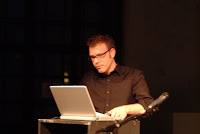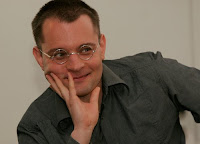Ok, there aren’t really any secrets but I haven’t seen any really biographical interviews with Florian anywhere else, so maybe it will be some kind of revelation. 🙂 I’ve known Florian for a long time now, about 15 years, but when working on my projects in the Netherlands, I realized we had never talked very explicitly about his own history with technology, art, culture, etc. –For reasons that will become clear, I am not using the term New Media.
In fact my first question was how Florian got involved with new media to begin with, and this led immediately to a a lengthy and detailed explanation of the problems with the term from a historical perspective. I will try to encapsulate it:
- First, new media means something totally different in the US than in Europe. Here it means digital or computer media, ala Lev Manovich, but in Europe TV and radio are often included in that, in fact, from a historical perspective, all media is new at some point.
- Second, the terms medium and media are being used incorrectly throughout the field. For example, if we speak of radio, one of the earliest technologies to be discussed as a medium, then technically the medium, the carrier of radio waves, is air. This was then extended metonymically to include the waves themselves, then further expanded to include the devices themselves, the senders, and even the receivers (that is the people sending and receiving). So that the term now encompasses so much, it’s not even very useful.
I explained that while I agreed with this critique, I’ve been using the term as the most broadly understood as covering the territory I mean to explore, but I am coming to believe that it’s really time to dispense with it altogether. At any rate, I reiterated my question, how did he get started?
According to Florian he started by programing his own computers when he was 13, and in fact might be considered to have been doing the same stuff for 25 years: he used computers to generate random poetry which he published in his own punk fanzine. 🙂 The most fascinating thing for him then was the random generator, though of course now that he’s “older and wiser” he knows that the randomness of a computer is not true randomness; it’s “pre-determined chance.” This shaped his interest; the kind of meta reality, textuality, emergence of code, and also the connection to society and all the arts.
But back to the timeline; I asked how at this starting point at 13, in 1982 how he even had a computer. Through friends he started using them, especially an older friend who used computers to trigger the light show for his music–all of this was programmed in Basic.
But his interest in computers went up and down; in the very early 90s he was on the internet but found it really boring; it was all controlled by system administrators and not much was going on. Now he reads papers by his students that glorify the old days, he says “oh but you couldn’t do much then; you couldn’t use your own server or install your own software; you could only dial up the university mainframe.”
I contrasted this to Sher Doruff’s experience that people felt even a sense of wonder at being able to connect at all. But of course she is older than Florian or I and so had a different set of expectations about what might be possible. Further, and I think this is a crucial factor affecting people’s attitudes toward computers and “new media,” Florian has always been quite skeptical about the technology itself and the promise it might hold. (A skepticism I share.) As he puts it:
They’re not the perfect machines and they’re not the dream machines, and this is what also cripples the whole new media field. Basically there have been all these kinds of utopian expectations. The first machine I had was incredibly primitive; it had 1 kb of memory. But today’s machines cannot really do more. And the structure of programming is not at all different, it’s just more comfortable. The machines have become faster but they haven’t become smarter. And what also surpised me, when I came to the Netherlands, is that even more than in other parts of the world, is the expectation that somehow computers will become smarter or less deterministic. And you can name those expectations with certain names such as artificial intelligence –where computers are not just stupid sytactic machines, but become semantic machines that have a true understanding. Or artificial life; that you have something like emergence , or whatever, out of computers. And the third one I think is new media. The whole idea, especially in the 1990s with the whole virtual reality nonsense, is that somehow through multi-media interfaces, the machine wouldn’t be this whole command-line deterministic thing, but would become more intuitive, less deterministic…. but if you’re a smart computer user you know that a mouse click is the same as typing a command. The logic remains the same.
So that is Florian’s take on new media as such, and a tiny bit about how he himself got involved. But in the next part we talked much more about the actual conditions of the field (however one names it) and about his own history, from being a graduate student in comparative literature to his current role as Director of the Media Design MA course at the Piet Zwart Institute.





